Lean Blog Interviews: Real-World Lean Leadership Conversations in Healthcare and Beyond
Lean Blog Interviews: Real-World Lean Leadership Conversations features thoughtful, in-depth discussions with leaders, authors, executives, and practitioners who are applying Lean thinking in the real world.
Hosted by Mark Graban—author of Lean Hospitals, Measures of Success, and The Mistakes That Make Us—the podcast explores Lean as a management system, a leadership philosophy, and a people-centered approach to continuous improvement.
Episodes span healthcare, manufacturing, startups, technology, and professional services. Guests share candid stories about what actually works—and what doesn’t—when organizations try to improve.
This is not a podcast about chasing tools, jargon, or “Lean theater.” Instead, you’ll hear honest conversations about leadership behaviors, culture, psychological safety, learning from mistakes, and building systems that help people do their best work.
If you believe improvement starts with respect for people—and that better systems beat blaming individuals—this podcast is for you.
Find show notes and all episodes at LeanCast.org.
Learn more about Mark Graban at MarkGraban.com.
Episodes

Friday Aug 29, 2025
Friday Aug 29, 2025
In this bonus episode of Lean Blog Interviews, Mark Graban is joined by William Harvey, AME 2025 Workshop Chair (and 2026 Conference Chair), to preview the AME Annual Conference coming up in St. Louis, October 6–9, 2025.
Topics We Discuss
✅ Why AME is for all continuous improvement leaders—not just manufacturing✅ The 2025 conference theme: Gateway to the Future – AI and Beyond✅ How AME is blending AI and people integration into learning and networking✅ Four key workshop tracks, including coaching, TWI, AI, and process excellence✅ Mark’s own Deming Red Bead Game & Process Behavior Charts workshop
Whether you’re in healthcare, services, or manufacturing, AME offers a unique chance to learn from practitioners, connect with peers, and gain new insights into operational and leadership excellence.
🔗 Links & Resources
Conference details
Workshop registration
Special discount code for Lean Blog listeners: NP-MARKG25
We hope to see you in St. Louis!

Wednesday Aug 20, 2025
Wednesday Aug 20, 2025
My guest for Episode #533 of the Lean Blog Interviews Podcast is Cheryl Jekiel, founder of the Lean Leadership Center and a longtime advocate for aligning continuous improvement with people-centered leadership.
Episode page with video, transcript, and more
Cheryl is the author of Lean Human Resources, and her latest book, Let Go to Lead: Six Habits for Happier, More Independent Teams (with Less Stress and More Time for Yourself), offers a practical and deeply human approach to modern leadership. With a background in HR and operations, Cheryl has spent decades helping organizations shift from hierarchical control to empowering, team-driven excellence.
In this episode, Cheryl shares her "Lean origin story," which began with a broken-down Ford and a transformative experience at Sweetheart Cup, where she witnessed firsthand how Lean thinking and redefined leadership roles could enhance both performance and the quality of work life. We discuss the importance of clarity in leadership--why vague directives like "take ownership" or "be proactive" often fail without behavioral specificity--and how shifting from being the problem-solver to being the coach can help leaders reduce stress and build truly independent teams. Cheryl also highlights how many organizations discuss empowerment but lack the necessary structures or shared understanding to actually enable it.
"We keep saying 'empower people,' but most organizations haven't defined what that actually means."
We also explore topics like vulnerability in leadership, the power of peer support communities, and how concepts like motivational interviewing--borrowed from healthcare and addiction counseling--can help leaders foster meaningful behavior change. Cheryl makes a compelling case for leadership as a practiced skill, not a fixed trait, and she encourages organizations to treat leadership development as an ongoing discipline. Whether you're an executive, HR leader, or improvement coach, this conversation offers actionable insight into how leaders can truly "let go to lead."
Questions, Notes, and Highlights:
What's your Lean origin story, and how did it shape your thinking?
How did your early experience at Sweetheart Cup influence your views on leadership and improvement?
Did you start your career in HR, or was that a later shift?
What led you to write Lean Human Resources and later start the Lean Leadership Center?
What was the inspiration for your new book, Let Go to Lead?
Are the six habits in your book rooted in traditional Lean leadership concepts, or do they expand on them?
Why is clarity such a critical leadership skill, and why do so many leaders struggle with it?
How do vague directives like "be proactive" or "take ownership" get in the way of effective leadership?
What role does psychological safety play in helping teams ask clarifying questions?
What's one of the habits you've found most overlooked or undervalued by leaders?
Why is community and peer support so essential to leadership development?
How do you help leaders embrace vulnerability in a culture that doesn't always reward it?
What's the role of ongoing practice in leadership development, and why isn't it emphasized more?
How does motivational interviewing relate to Lean leadership and coaching?
How can leaders avoid the trap of trying to be "right" rather than being helpful?
Why is "meeting people where they are" such a vital leadership practice?
What advice would you give to leaders who want to let go of control without abdicating responsibility?
What's the connection between letting go and reducing stress for leaders?
Is there anything else you'd like to share about your book or your work?
This podcast is part of the #LeanCommunicators network.

Wednesday Aug 06, 2025
Wednesday Aug 06, 2025
My guest for Episode #532 of the Lean Blog Interviews Podcast is Anne Frewin, a seasoned Lean leader with over 12 years of improvement experience in healthcare, laboratories, and manufacturing.
Updated with the correct audio
Episode page with video, transcript, and more
Anne's background in finance and healthcare administration provided her with a unique entry point into Lean -- first supporting improvement efforts through data, and then stepping fully into the role of change agent. She shares the story of how a persistent mentor who always asked "why" helped her shift from just reporting metrics to developing problem-solving thinking and leading transformation efforts herself.
In this conversation, Anne and I explore how Lean principles, such as respect for people, effective idea systems, and a problem-solving culture, manifest in real-world settings. She explains why she prioritizes coaching people to become relentless problem solvers and how systems like visual management and simple idea boards, when supported with good questions, can lead to safer, more efficient work. We also discuss how Lean applies differently (but effectively) across industries, the balance between improvement and documentation, and how to avoid siloed thinking when solving cross-functional challenges--especially in healthcare.
"A strong idea system is the first real show of respect for people--it tells the frontline we value their insight and want them to own the solution."
Anne also shares her perspective on Lean, Six Sigma, and Lean Six Sigma, offering a practical framework for how these approaches can coexist while serving different purposes. Throughout the episode, we reflect on systems thinking, psychological safety, and the importance of learning through experimentation. Whether you're in healthcare, manufacturing, or any people-centric industry, Anne's passion for leadership development and continuous improvement offers valuable insights.
Questions, Notes, and Highlights:
How did you first get exposed to Lean, and why did it resonate with you?
Looking back, did your mentor's persistent "why" questions help develop your thinking more than if he had been directive?
How would you explain the concept of a Lean operating system to an executive unfamiliar with it?
What's the difference between "respecting people" and "respect for people" in your view?
Can you share an example of an effective idea system that truly engages frontline staff?
How do you balance employee-generated ideas with the need for leadership support and coaching?
What's your approach to helping people decide whether to use a rapid improvement event, an A3, or a PDSA cycle?
What are the three questions you use to evaluate whether an idea is safe to try?
How do you coach teams to iterate and learn from problems when working across functional silos?
Can you share a healthcare example where process mapping revealed hidden breakdowns or assumptions?
How do you handle improvement suggestions that require significant changes, like IT systems or facility layout?
How do you view the relationship between safety, quality, delivery, and financial performance?
What's your perspective on Lean vs. Six Sigma vs. Lean Six Sigma, based on your experience?
How do you see variation reduction as part of Lean, not just Six Sigma?
What was it like moving from healthcare into manufacturing? What was surprisingly transferable?
Did you encounter documentation or quality systems in manufacturing that got in the way of improvement?
How do you deal with the extremes--either lack of standardization or over-control through documentation?
What reflections do you have about the human side of improvement--what helps people succeed in these systems?
This podcast is part of the #LeanCommunicators network.

Sunday Aug 03, 2025
Patrick Adams Previews the 2025 Lean Solutions Summit in Detroit
Sunday Aug 03, 2025
Sunday Aug 03, 2025
In this bonus episode of Lean Blog Interviews, host Mark Graban welcomes back Patrick Adams, founder of the Lean Solutions team and author of Avoiding the Continuous Appearance Trap—a Shingo Publication Award-winning book. Patrick joins the show to preview the 2025 Lean Solutions Summit, taking place September 23–25 in Detroit, Michigan, at the Westin Detroit Airport.
This year’s theme—“Catalysts of Tomorrow: Shaping Future Leaders”—focuses on equipping the next generation of Lean and continuous improvement professionals with the mindset, tools, and leadership capabilities needed to thrive. The summit will feature high-impact keynote presentations, hands-on workshops, and an all-new Executive Track designed specifically for senior leaders.
Patrick and Mark discuss the keynotes from Lean legends and storytellers including Mike Rother, Tom Root of Zingerman’s, Stefan Thurner, and more. Other familiar faces in the Lean community—like Katie Anderson, Billy Taylor, and Tilo Schwarz—will return to lead breakout sessions and support the event’s popular Lean Excellence World Championship. This hands-on competition not only builds problem-solving skills but also supports a local Detroit nonprofit through real impact.
Whether you're a seasoned leader or a student just beginning your Lean journey, the 2025 Lean Solutions Summit promises inspiration, actionable insights, and meaningful connections.
🌐 Learn more & register: findleansolutions.com/lean-solutions-summit

Tuesday Jul 29, 2025
Jared Thatcher on Growing the Global Lean Summit and Partnering with Toyota
Tuesday Jul 29, 2025
Tuesday Jul 29, 2025
In this bonus episode of Lean Blog Interviews, host Mark Graban talks with Jared Thatcher, founder of the Global Lean Summit, to preview the upcoming event taking place September 23–25, 2025 in Bloomington, Indiana.
Jared shares the Summit’s origin story—from a virtual event launched during COVID lockdowns to a high-impact in-person gathering that brings together Lean leaders, practitioners, and learners from a wide range of industries.
This year’s Summit includes:✅ A site visit and training day at Toyota Material Handling✅ A new healthcare track, co-hosted with Indiana University’s medical school✅ A foundational Kaizen facilitation workshop for hands-on learning✅ Free in-person access for university students✅ A 30-60-90 day virtual follow-up to help participants apply what they learned
Notable speakers include Phil Wickler (GE Aerospace), Sam McPherson, Mohamed Saleh, Nick Katko, Hide Oba, and Mark Graban, among others.
Whether you’re just starting your Lean journey or looking to deepen your capabilities, the Global Lean Summit is designed to foster meaningful connections, practical learning, and sustained improvement.
🌐 Learn more and register at GlobalLeanSummit.com💡 Subscribe & catch new episodes at LeanCast.org

Wednesday Jul 23, 2025
Melisa Buie on Lean Culture, Scientific Thinking, and Empowering Engineers
Wednesday Jul 23, 2025
Wednesday Jul 23, 2025
My guest for Episode #531 of the Lean Blog Interviews Podcast is Dr. Melisa Buie, a seasoned operations and engineering leader with decades of experience in high-tech manufacturing.
Episode page with video, transcript, and more
Melisa has held senior roles at companies like Lam Research, Applied Materials, and Coherent, where she led large-scale Lean transformations and helped drive cultural change across global operations. With a PhD in nuclear engineering and plasma physics, Melisa brings a rare combination of technical depth and people-centered leadership to her work.
In this episode, we explore Melisa’s Lean journey — from her early days in Six Sigma to becoming a global Lean leader at Coherent. She shares how her perspective shifted from project-based improvement to empowering teams with daily problem-solving skills. Melisa discusses the critical role of psychological safety in building a continuous improvement culture, and how giving people "permission to improve" must be backed by leadership behavior and support. We also touch on the challenges of applying Lean principles in complex, low-volume/high-mix manufacturing environments and why principles still matter more than tools.
We also discuss Melisa’s book Problem Solving for New Engineers, written to bridge the gap between academic preparation and the real-world challenges engineers face in industry. She previews her upcoming book, Faceplant: Free Yourself from Failure’s Funk, which tackles the emotional side of failure and how we can grow through it. Whether you're a Lean leader, a coach, or an engineer just starting out, this episode is packed with valuable insights on leadership, learning, and making improvement accessible for everyone.
Questions, Notes, and Highlights:
How did you first get involved with Lean or Six Sigma?
Which books influenced you early in your Lean journey?
How did your company shift from project-based Six Sigma to a Lean culture?
Where did the push for culture change come from—top-down or grassroots?
What role did you play in leading Lean at Coherent?
What does it mean to “give people permission to improve,” and why is that necessary?
How do leaders create psychological safety to support continuous improvement?
How did your background in nuclear engineering and plasma physics lead to a career in semiconductors and lasers?
How do Lean principles apply in low-volume, high-mix environments?
What inspired you to write Problem Solving for New Engineers?
How does the book help bridge the gap between university labs and industry problem solving?
Why is experimentation and scientific thinking often missing in workplace culture?
How do you explain the value of iterative cycles like PDSA to new engineers?
What is design of experiments (DOE), and how does it improve problem solving?
When is it helpful to let people run experiments with predictable outcomes?
How did your second book, Faceplant: Free Yourself from Failure’s Funk, come about?
Why do people fear failure in personal life but accept it in professional settings?
How can we reframe failure as a learning opportunity rather than something to avoid?
How do you personally deal with failure and setbacks, like learning a foreign language?
This podcast is part of the #LeanCommunicators network.
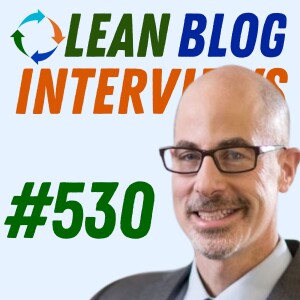
Wednesday Jul 09, 2025
Transforming Healthcare: Ken Segel on Lean, Shingo, and Operating Systems
Wednesday Jul 09, 2025
Wednesday Jul 09, 2025
My guest for Episode #530 of the Lean Blog Interviews Podcast is Ken Segel, Co-Founder and Chief Relationship Officer at Value Capture.
Episode page with video and more
With over two decades of experience in healthcare improvement, Ken has been instrumental in guiding Value Capture's mission: helping healthcare organizations pursue habitual excellence by applying principles of safety, transparency, and systems thinking. In this episode, Ken shares lessons drawn from his unique and non-traditional journey--from public policy work in Washington, D.C. to transformative partnerships with industry icon Paul O'Neill and the Pittsburgh Regional Health Initiative.
Ken and I explore why world-class safety, quality, and financial performance can and must co-exist, and how starting with safety unlocks powerful learning across any organization. He reflects on how Paul O'Neill inspired leaders to set seemingly audacious goals like "zero harm"--not to punish failure, but to align people around shared purpose and continuous improvement. We also discuss the importance of creating a comprehensive operating system, one that fully integrates work systems, management systems, and improvement systems--not just Lean tools or events in isolation.
Listeners will learn why Ken believes deeply in the Shingo Principles, and why Value Capture remains the only Shingo Affiliate firm dedicated exclusively to healthcare. He also talks about the recent leadership transition at Value Capture, passing the CEO baton to longtime colleague Shanna Padgett. Whether you're a Lean healthcare leader or someone passionate about values-based leadership, this conversation offers rich insights into guiding with purpose, learning from failure, and building systems that support excellence for all.
Ken previously appeared on My Favorite Mistake (Episode 147), where he shared a powerful story about early-career lessons in leadership and systems thinking that helped shape his path into healthcare improvement.
Questions, Notes, and Highlights:
Can you share your Lean origin story?
(How did your unconventional path lead you into this work?)
What was it like working with Paul O'Neill, and how did he influence your thinking?
What was the vision and impact of the Pittsburgh Regional Health Initiative?
Why was setting a goal of zero harm so controversial--and so powerful?
How did leaders like Dr. Richard Shannon apply these principles to dramatically improve patient safety?
Where do you see progress--and continued challenges--around transparency and safety sharing in healthcare?
Why is safety such an effective entry point for broader transformation?
How do you define a "comprehensive operating system" in a healthcare context?
What's the difference between a management system and a full operating system?
How can the Shingo principles support healthcare organizations on their improvement journey?
What does it mean for Value Capture to be a Shingo Affiliate focused solely on healthcare?
What advice would you give to a health system leader who thinks they already have a Lean system in place?
Can you share the recent leadership transition news at Value Capture?
This podcast is part of the #LeanCommunicators network.
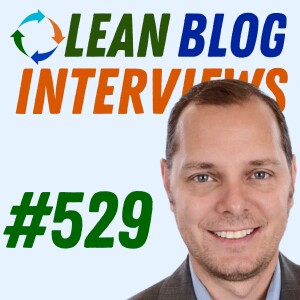
Wednesday Jun 25, 2025
Wednesday Jun 25, 2025
My guest for Episode #529 of the Lean Blog Interviews Podcast is Scott Gauvin, CEO of Macresco and co-creator of the Respect for People Roadmap.
Episode page with video, transcript, and more
With 30 years of experience leading operational transformations across sectors including biotech, pharma, agriculture, and manufacturing, Scott brings both a systems mindset and a people-first philosophy to his work. His journey into Lean began with frustration over leadership that blamed people rather than fixing systems—sparking a personal quest to better integrate continuous improvement with what he calls the “practice” of respect for people.
In this episode, Scott shares the evolution of his thinking and how it culminated in the Respect for People Roadmap, a structured learning experience designed to operationalize cultural change through nine actionable behaviors. We explore the difference between “respecting people” as an individual action and “respect for people” as a system-level design principle. Scott also challenges the common notion that respect must be earned, arguing instead that every human being is inherently worthy of it—an idea rooted in his research on Confucian influences within Toyota’s founding culture.
This conversation is a must-listen for anyone struggling to move beyond Lean tools and truly build a culture of continuous improvement grounded in human dignity. We also touch on how these ideas align with the Shingo Model, why so many transformations fail to stick, and how organizations can design systems that scale respect—without waiting for permission from the top. Check the links below to learn more and access Scott’s free “test drive” version of the Roadmap.
Questions, Notes, and Highlights:
What’s your origin story with Lean and operational excellence?
What drew you to explore the “respect for people” pillar more deeply?
How do you distinguish between “respect for people” and “respecting people”?
Why do so many interpretations of “respect” default to hierarchy or politeness?
How should leaders approach differences in how individuals define respect?
Is it a mistake to assume respect must be earned rather than given?
What are your thoughts on the phrase “better to be respected than liked”?
How do challenge, kaizen, and respect interrelate in Toyota thinking?
What did your research uncover about Confucianism’s influence on Lean?
How does the concept of “respect for people” show up in system design?
What inspired the creation of the Respect for People Roadmap?
What are the three key behavioral principles embedded in the Roadmap?
What makes this program scalable and sustainable across organizations?
Why was it important that the nine behaviors require no leader permission?
How do you respond to the idea that “respect for people” should be translated as “respect for humanity”?
Are you looking to pilot the Roadmap in healthcare settings?
What would transformation look like if it were truly resilient—not dependent on a single leader
This podcast is part of the #LeanCommunicators network.
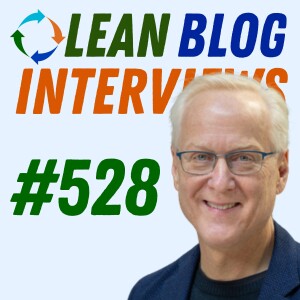
Wednesday Jun 11, 2025
Mark Reich, Former Toyota Leader on Hoshin Kanri and 'Managing on Purpose'
Wednesday Jun 11, 2025
Wednesday Jun 11, 2025
My guest for Episode #528 of the Lean Blog Interviews Podcast is Mark Reich, a Senior Lean Coach with the Lean Enterprise Institute and former Toyota leader with over two decades of experience.
Episode page with video, transcript, and more
Mark spent six years working in Japan, including helping launch the Lexus brand and later leading Hoshin Kanri strategy processes during Toyota's rapid growth in North America. He also played a pivotal role at the Toyota Supplier Support Center (TSSC), helping bring the Toyota Production System to manufacturing, healthcare, and nonprofit organizations. In our conversation, we dive into his career journey, his approach to Lean leadership, and the practical lessons behind his new book, Managing on Purpose: Using Hoshin Kanri to Develop Strategy, Align Teams, Grow Leaders, and Innovate Your Enterprise.
You can get a 25% discount on the book via LEI using the code LBIPODCAST25.
Mark shares compelling stories from his early days at Toyota, including working on the front lines of assembly, learning by doing, and his first experience pulling the andon cord. These moments shaped his appreciation for Toyota's deep respect for frontline work and its commitment to developing people. He reflects on how Toyota embeds learning and support into problem solving, where pulling the cord is seen as a learning opportunity, not a failure. That mindset became foundational for his later work, especially when managing enterprise-wide strategy through Hoshin Kanri.
We also explore what Hoshin Kanri really is--and what it isn't. Mark challenges the overemphasis on tools like the X-matrix and instead advocates for focusing on purpose, alignment, and leadership behavior. He explains how strategy deployment at Toyota was never a one-way cascade, but a dialogue grounded in humility, curiosity, and shared responsibility. Whether you're new to Hoshin or struggling to sustain it, Mark offers insights that can help any leader make strategy a living, breathing part of organizational culture.
Questions, Notes, and Highlights:
How did you end up working for Toyota, and what led you to Japan?
What was your educational background, and did you already speak Japanese before moving there?
What was your initial role at Toyota, and how did it relate to their global expansion?
Did you meet or work with John Shook during your time in Japan?
How did Toyota develop you into an industrial engineer despite your background in English writing?
What was it like working in a Toyota plant, and what did you learn from that experience?
Did you experience any early mistakes or learning moments while working the line?
How did your role evolve after leaving Japan, and how did you get involved with Hoshin Kanri in North America?
What challenges was Toyota North America facing that made Hoshin Kanri so essential?
How did you facilitate alignment and catchball between Toyota's plants and leadership teams?
How do you define Hoshin, strategy, and Hoshin Kanri?
Why do you prefer not to use the term "strategy deployment," and what's the issue with top-down-only thinking?
How do you coach executives to embrace catchball and bottom-up engagement?
How do you balance executive direction with frontline input in strategy development?
What role does psychological safety play in making Hoshin Kanri work?
How does A3 problem solving fit into the Hoshin process, and how does it help build capability?
Why is it important for executives to practice PDCA and engage in direct problem solving?
What's the difference between long-cycle and short-cycle PDCA, and how should leaders manage both?
Why does it take most organizations a couple of years to fully embed Hoshin Kanri?
What lessons do companies learn when they start with too many strategic initiatives?
Why did you choose not to include the X-matrix in your book, and what are your thoughts on its use?
What business problems does Hoshin Kanri best help organizations solve?
How can Hoshin Kanri help clarify the distinction between daily management and long-term strategic work
This podcast is part of the #LeanCommunicators network.
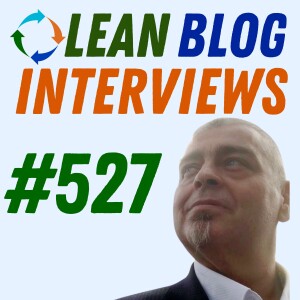
Tuesday May 13, 2025
Tuesday May 13, 2025
My guest for Episode #527 of the Lean Blog Interviews Podcast is Dave Fitzpatrick, co-founder of Zenkai Improvement Partners and a 30-year resident of Japan. Dave brings a unique perspective as a Canadian Lean practitioner who has worked extensively in both manufacturing and healthcare, guiding international leaders on immersive study experiences throughout Japan.
Episode page with video, transcript, and more
In this episode, Dave and I share details about a new collaboration we're leading together--the Lean Healthcare Accelerator Experience. This is a jointly developed series of immersive visits to high-performing organizations in Japan, designed specifically for healthcare executives who want to see Lean principles in action across both hospitals and manufacturing settings. We talk about why we're creating this experience, what makes it unique, and how cultural context, leadership behaviors, and intentional long-term commitments drive sustainable improvement--not because it's "just Japan," but because of the systems and mindsets these organizations have cultivated.
Dave shares his personal Lean journey, including how he transitioned from working in aeronautics to leading study tours for visiting professionals. He reflects on the differences between Japanese and Western companies when it comes to employee engagement, psychological safety, and respect for people. We also preview the first Accelerator trip taking place in June 2025 and discuss what makes these experiences so valuable and transformational for participants.
Whether you're in healthcare or another industry, this conversation is packed with insights about creating a culture of continuous improvement--and how a visit to Japan can accelerate your learning.
Questions, Notes, and Highlights:
Can you share your origin story--how did you first get involved with Lean, Kaizen, or the Toyota Production System?
What initially stood out to you when you began visiting Japanese manufacturing and healthcare organizations?
From your experience, what cultural factors give Japanese organizations an advantage--or do they?
How do successful Japanese companies build deep employee engagement and commitment to improvement?
What lessons can visitors take home from Japan--and why is it not just about being "Japanese"?
What are some common misconceptions people have before visiting Japan on these study experiences?
How does hierarchy or seniority in Japanese companies affect psychological safety and speaking up?
What kinds of organizations will we be visiting during the Lean Healthcare Accelerator?
What role will Reiko Kano play in these visits, and how does her expertise go beyond translation?
What's the value of including manufacturing visits in a healthcare-focused learning experience?
How do Japanese companies view improvement work in relation to headcount and job security?
Why is respect for people and time such a noticeable theme in Japanese customer service and operations?
What do you hope participants in the Lean Healthcare Accelerator take away from this experience?
This podcast is part of the #LeanCommunicators network.
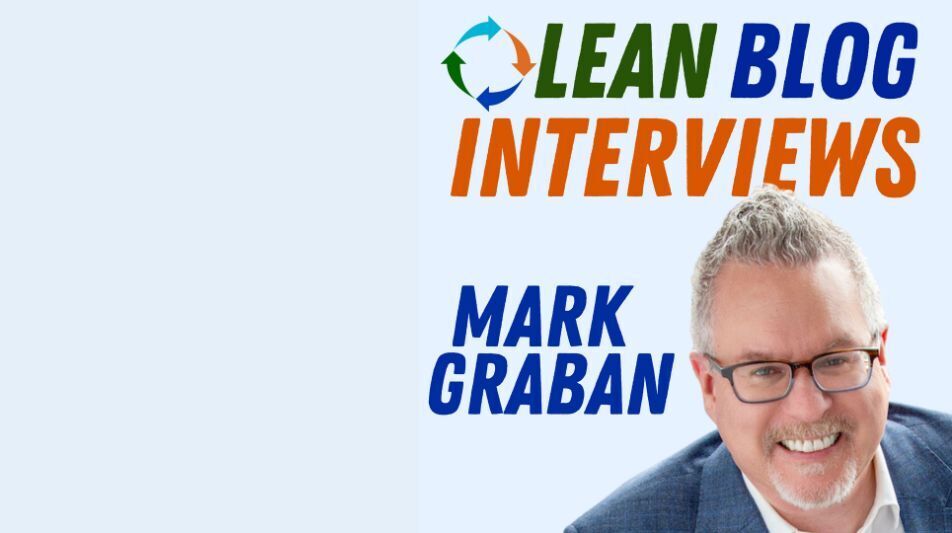
About Mark Graban
Mark Graban is an author, speaker, and consultant, whose latest book, The Mistakes That Make Us: Cultivating a Culture of Learning and Innovation, is available now.
He is also the author of the award-winning book Lean Hospitals: Improving Quality, Patient Safety, and Employee Engagement and others, including Measures of Success: React Less, Lead Better, Improve More.
He serves as a consultant through his company, Constancy, Inc, and is also a Senior Advisor for the technology company KaiNexus.
Mark hosts podcasts, including “Lean Blog Interviews” and “My Favorite Mistake.”
Education: B.S. in Industrial Engineering from Northwestern University; M.S. in Mechanical Engineering, and M.B.A. from the Massachusetts Institute of Technology’s Leaders for Global Operations Program.







